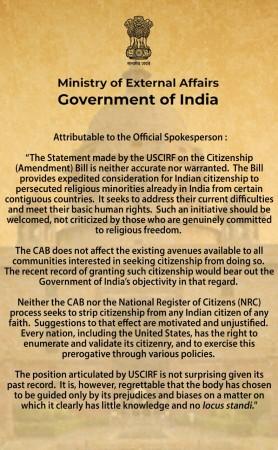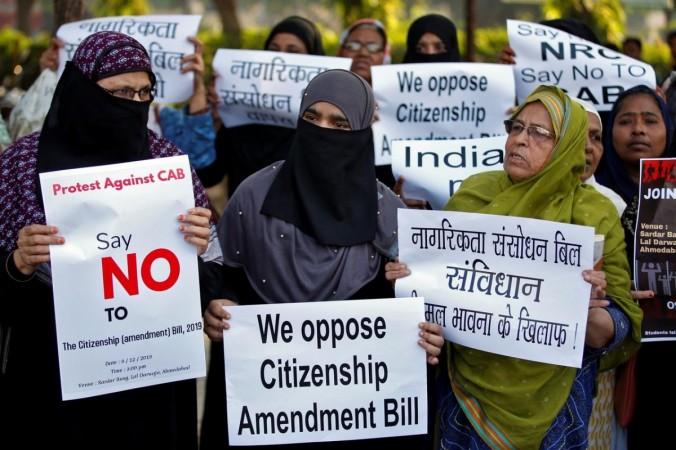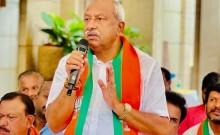Replying to USCIRF's statement on Citizenship (Amendment) Bill, India said the US panel condemning the controversial bill, now pending approval by the Rajya Sabha, is "neither accurate nor warranted". If made law, the CAB would give non-Muslim refugees from religious persecution in Pakistan, Afghanistan and Bangladesh a path to Indian citizenship.

'Dangerous turn in wrong direction'
Stating that the Citizenship (Amendment) Bill, 2019 is a "dangerous turn in wrong direction", a US federal commission has sought American sanctions against Home Minister Amit Shah if the bill gets a nod in Rajya Sabha as well.
The bill seeks to provide Indian nationality to Hindus, Christians, Sikhs, Parsis, Jains and Buddhists fleeing persecution in Pakistan, Afghanistan and Bangladesh. It was cleared in the Lok Sabha on Monday midnight, with 311 voting in support and 80 against.
While major opposition parties described the bill as "anti-Muslim", Union Home Minister Amit Shah said that Indian Muslims have no reason to fear as it will not affect the Muslim community residing in the country.

The Treasury benches called it a historical Bill while the opposition dubbed the move as one to "kill secularism and Constitution of India" and "another attempt of partition" in the country in the name of religion and "violation of Article 14 of the Constitution".
Major opposition parties, including Congress, Trinamool Congress, Revolutionary Socialist Party, Dravida Munnetra Kazhgam (DMK), All India Majlis-e-Ittehad-ul-Muslimeen (AIMIM), Indian Union Muslim League (IUML), AIUDF, Bahujan Samaj Party, Samajwadi Party, Aam Aadmi Party and YSR Congress Party opposed the Bill citing various articles of the Constitution.
'Deeply troubled'
The US Commission for International Religious Freedom (USCIRF) said on Monday that it was deeply troubled over the passage of the bill in Lok Sabha.
"If the CAB passes in both houses of parliament, the US government should consider sanctions against the Home Minister Amit Shah and other principal leadership," the commission said.
"USCIRF is 'deeply troubled' by the passage of the CAB, originally introduced by Home Minister Shah, in the Lok Sabha given the religion criterion in the bill," it added.
The USCIRF alleged that the CAB enshrines a pathway to citizenship for immigrants that specifically excludes Muslims, setting a legal criterion for citizenship based on religion.
"The CAB is a dangerous turn in the wrong direction; it runs counter to India's rich history of secular pluralism and the Indian Constitution, which guarantees equality before the law regardless of faith," it said.
Stating that in conjunction with the ongoing National Register of Citizens (NRC) process in Assam and nationwide NRC that Home Minister Shah seeks to propose, the commission said: "USCIRF fears that the Indian government is creating a religious test for Indian citizenship that would strip citizenship from millions of Muslims".

It also said that for more than a decade now the Indian government has ignored the statements and annual reports of the USCIRF.
India from the days of the previous United Progressive Alliance (UPA) regime has consistently said that it does not recognise a third country's views or reports on its internal affairs.
It is based on this ground that India for more than a decade now has denied visas to the USCIRF to travel to India for their on the ground assessment of the religious freedom in India.
Recommendations of USCIRF are not enforceable. However, its recommendations are seriously taken into consideration by the US Government, in particular, the State Department which is tasked with powers to take sanctionable actions against foreign entities and individuals for violation of religious freedom and human rights.
(With agency inputs.)















